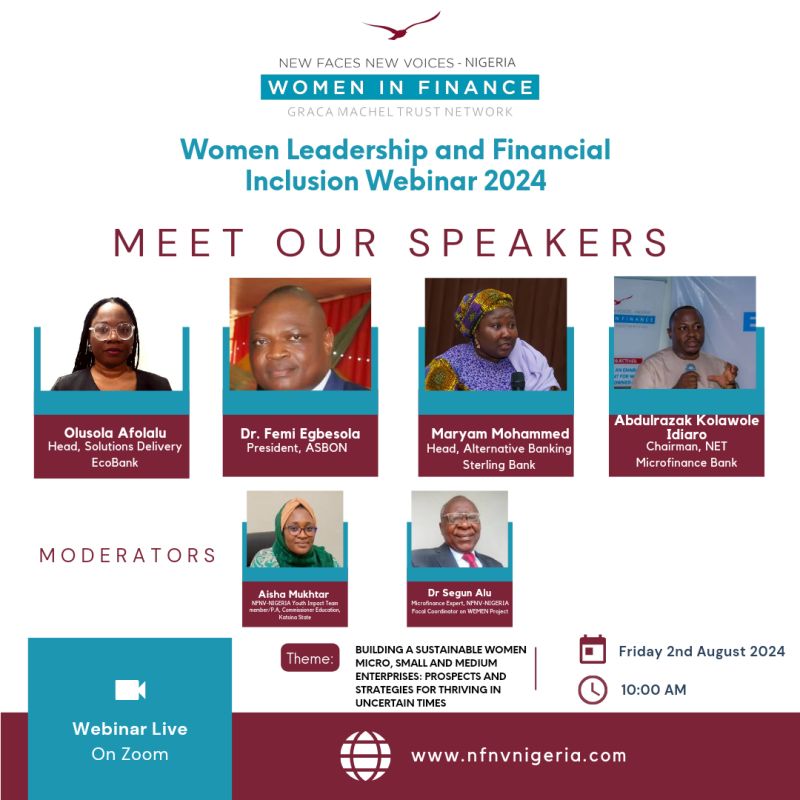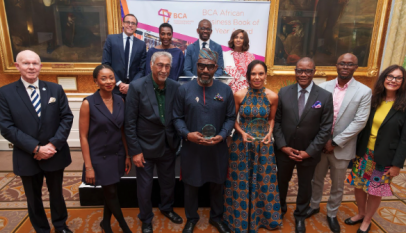NFNV NIGERIA: Building Resilient, Sustainable Nigerian Women-owned MSMEs
New Faces, New Voices (NFNV) Nigeria under the Women in Leadership and Financial Inclusion (WLFI) project recently hosted Nigerian women entrepreneurs for a webinar themed: “Building a Sustainable Women, Small and Medium Enterprises: Prospects and Strategies for Thriving in Uncertain Times.”

The webinar discourse centered around the unique challenges and opportunities faced by Women Micro, Small, and Medium Enterprises (WMSMEs) in Nigeria, especially in the wake of the COVID-19 pandemic. The virtual event convened a diverse array of stakeholders, including policymakers, women entrepreneurs, financial institutions, fintech operators, and business support organisations.
The central message of the webinar was the sustainability and growth of women-owned MSMEs in Nigeria, which largely depends on their ability to adapt, innovate, and collaborate in the face of economic uncertainties. The strategies and insights shared during the event underscored the importance of building a strong risk management culture, leveraging digital tools, and forming strategic partnerships to navigate the challenges of a VUCA economy.
A VUCA economy refers to an environment characterized by Volatility, Uncertainty, Complexity, and Ambiguity (VUCA). Whereas Volatility indicates rapid and unpredictable change, uncertainty reflects the difficulty in predicting future events. Moreover, Complexity denotes the interrelated factors that make decision-making more challenging just as Ambiguity suggests unclear or incomplete information. Businesses must be agile, innovative, and resilient to successfully navigate the unpredictable and ever-changing VUCA landscape.
In her opening remarks, Aishatu Debola Aminu, Country Director of NFNV Nigeria, emphasized the critical role of Women-owned Micro, Small, and Medium Enterprises (WMSMEs) in Nigeria’s economy, noting that WMSMEs are not just contributors to economic growth; they are lifelines for household livelihoods and job creation. Despite their vital contributions, women entrepreneurs in Nigeria face a myriad of challenges, including systemic issues such as inflation, high-interest rates, and forex scarcity.
Mrs Aminu said these challenges have only intensified in the post-pandemic era, further exacerbating the volatility and uncertainty within the country’s business environment. She underscored the dual shocks of the pandemic and its resultant economic shutdowns which reversed many of the gains made in women’s economic empowerment across Africa. “This webinar addresses these setbacks by providing a platform for dialogue, knowledge sharing, and strategy development, focusing on key areas such as access to funding, business sustainability, and risk management.”
Navigating Nigeria’s economic Challenges through Risk Management
One of the central themes of the webinar was the importance of risk management for women-owned businesses. Dr Femi Egbesola, National President of the Association of Small Business Owners of Nigeria (ASBON), outlined the various forms of business risks women-owned businesses must learn to navigate – from economic and political risks to the challenges posed by Nigeria’s regulatory environment. “Failing to have a plan to address risk in your business is the equivalent of planning for your business to fail.”
Dr Egbesola discussed the lack of a risk management culture among many women entrepreneurs, who often view risk management as a reactive process rather than a proactive one. This mindset, he argued, limits their ability to identify and address potential risks in a timely manner. He cited the indefinite closure of the Dosumu market due to incessant fire outbreaks as a case study. “Risk management requires dedicated resources, expertise, and a strategic approach,” he explained,
He therefore urged women entrepreneurs to invest in risk management to build resilience in their businesses. “Nigerian businesses can overcome these challenges by developing a strong risk management culture, allocating sufficient resources, addressing regulatory requirements, and implementing effective strategies to mitigate both internal and external risks. By doing so, businesses can enhance their resilience, protect their assets, and improve their overall performance in the Nigerian market.”
Innovative Business Models for Thriving in a VUCA Economy
The discussion also explored innovative business models that could help women-owned businesses thrive in a VUCA economy. To this end, Ms Olushola Afolalu, Head of Solutions Delivery at Ecobank, emphasized the need for adaptive leadership and strategic planning. “In a VUCA world, businesses must be flexible and responsive to changing circumstances while maintaining a clear vision for the future,” she said.
Ms Afolalu highlighted several key strategies, including the diversification of supply chains and revenue streams, continuous learning and development as well as the strengthening of organizational structures. She also underscored the importance of investing in technology and leveraging digital tools to enhance business operations. “Digital transformation is no longer optional; it is essential for survival and growth in today’s business environment,” she emphasized.
She cited examples of successful collaborations between women entrepreneurs and larger agencies which have enabled the women entrepreneurs to take on larger projects without overextending their resources. “Building a support network can provide a safety net and open doors to new markets and opportunities,” noted Afolalu.
Mr Abubakar Musa of Alternative Bank said his bank had the launched a number of initiatives aimed at supporting women entrepreneurs and addressing the critical challenge of limited access to funding. In recognition of the significant contribution of MSMEs to Nigeria’s economy, he said the bank introduced two financing products, AltBiz and Alt Lease, which have disbursed over N8 billion to more than a thousand MSMEs across Nigeria, thereby bolstering economic stability.
AltBiz is a Murabaha-based product providing quick funds for working capital and asset acquisition, with a maximum financing limit of N5M and a 15.5% annual mark-up rate, whereas Alt Lease is an ijarah-based facility which offers financing for tangible assets such as machinery and vehicles, with a single obligor limit of N20M and a 30% annual mark-up rate. Both products require personal guarantees and are designed to support the operational needs of businesses, excluding payment for services.
Mr Abdulrazak Idiaro, Chair of NET Microfinance Bank highlighted several key strategies, including the diversification of supply chains and revenue streams, continuous learning and development, and the strengthening of organizational structures. He also underscored the importance of investing in technology and leveraging digital tools to enhance business operations. “Digital transformation is no longer optional; it is essential for survival and growth in today’s business environment,” he added.
Ms Afolake Oladitan, Coordinator of Women in Business, Trade, and Export (WIBTE) at NFNV Nigeria, highlighted the importance of creating an environment where women-led enterprises can thrive, even amidst global economic challenges. Ms Oladitan said despite the dual shocks of the COVID-19 pandemic and economic shutdowns, women entrepreneurs in Nigeria have shown resilience and determination in navigating the VUCA economy.
Speakers at the webinar urged participants to exchange ideas, learn from one another, and create pathways for a more inclusive and resilient economic landscape for Nigerian women enterpreneurs. The webinar not only provided valuable insights and strategies for women entrepreneurs but also reaffirmed NFNV Nigeria’s commitment to advancing women’s economic empowerment and building a sustainable future for WMSMEs in Nigeria.
















